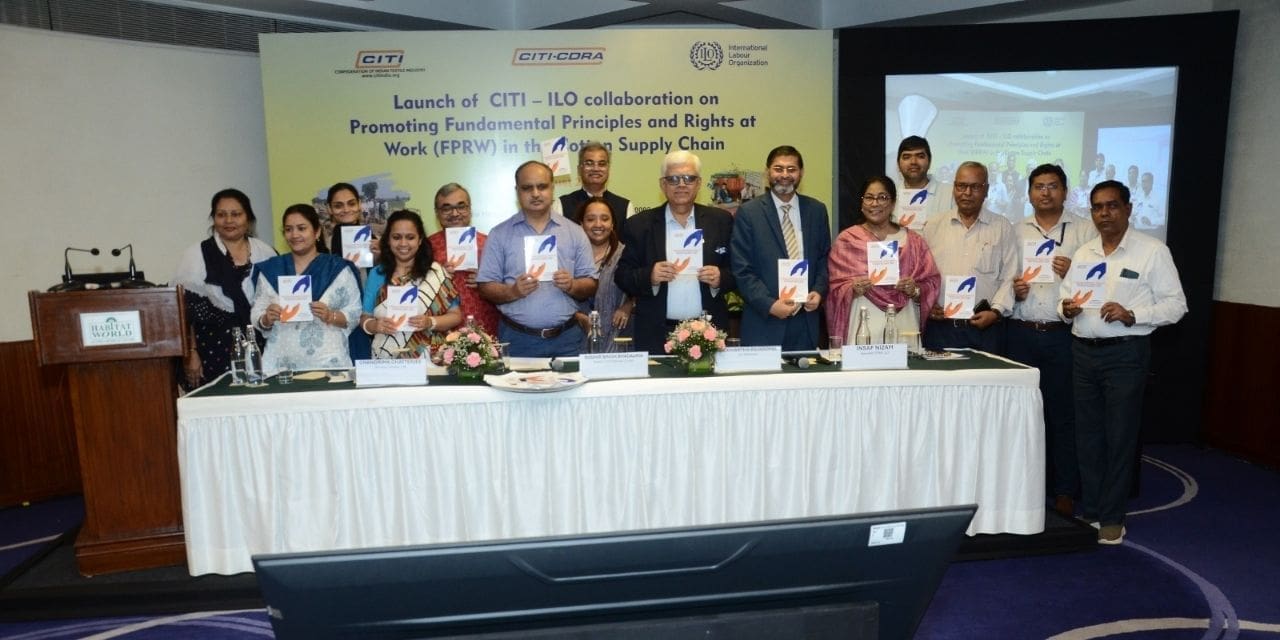New Delhi, 13th August 2024 –
The Confederation of Indian Textile Industry (CITI), in collaboration with the International Labor Organization (ILO), has initiated an extensive project with the goal of advancing Fundamental Principles and Rights at Work (FPRW) within the cotton farming community. This initiative is part of CITI’s ongoing endeavor to improve India’s cotton farming community. The first phase of the project would concentrate on Madhya Pradesh’s principal cotton-producing areas.
Unveiled today at the Indian Habitat Centre in New Delhi, the program is a critical step in providing 6.5 million cotton farmers—of whom 40% are women—with fair labor standards, social protection, and sustainable livelihoods. Throughout the project, migrant laborers farming cotton on leased land as well as small and marginal farmers will receive particular attention.
This project, which focuses on Madhya Pradesh’s cotton-rich districts, aims to empower small and marginal farmers by raising their understanding of worker rights, offering technical assistance for the execution of policies, and facilitating their access to vital social protection programs. During the introduction, a thorough pamphlet outlining the government programs available to farmers was also made available. Through the program, farmers will receive such educational pamphlets and tutorials, providing a crucial resource for the cotton farming community.
The cotton supply chain in India is extensive and intricate, encompassing both formal and informal industries. As it moves into its second phase in Madhya Pradesh, the ILO’s “Promoting Fundamental Principles and Rights at Work (FPRW) in the cotton supply chain – Rise for Impact” project draws on the achievements and lessons learnt from its first implementation in Telangana (2019–2022). In keeping with CITI-CDRA’s ongoing work on the specific project on cotton, this phase makes sure that the fundamental ideas of FPRW are ingrained in routine agricultural operations.
Key Initiatives and Impact.
The CITI-ILO collaboration will drive several key initiatives with the below-given objectives:
• Cotton growing communities are better aware and empowered to realize FPRW
• Responsible institutions/constituents and stakeholders able to ensure FPRW
• Stakeholders have better access to knowledge and tools to promote FPRW.
The launch event in Delhi was attended by Senior Government officials, industry leaders, trade unions, agriculture scientists, etc. The project marked the beginning of the Training of Trainers programs held at Indore with the participation of about 30 trainers who will be imparting training on FPRW for the next 1 year of the project.
During the event, Secretary General CITI, Ms. Chandrima Chatterjee in her opening remarks cited “This collaboration between CITI and the ILO is a significant stride towards creating a fair and equitable environment for our cotton farmers. By promoting FPRW, we aim to ensure that these hardworking individuals are recognized, respected, and able to thrive within the global supply chain.”
Executive Director, TEXPROCIL, Dr. Siddhartha Rajagopal shared the need and strategies for strengthening cotton value chain through a strong farm sector while Mr. Insaf Nizam, FPRW Specialist, ILO DWT for South Asia and CO for India, stressed the importance of grassroots empowerment: “Empowering smallholders with knowledge of their rights is essential to achieving decent work in the cotton sector. This project is designed to bring these principles to life, impacting thousands of farmers across Madhya Pradesh.”
Speaking on the collaboration, Chairman-CITI, Shri Rakesh Mehra cited that “The cotton we cultivate not only supports our domestic industry but also feeds into the global textile industry, influencing markets and economies worldwide. By ensuring that our cotton is produced under fair and dignified conditions, we not only uplift our farmers but also enhance the reputation of Indian cotton on the global stage.”
“For last 54 years, CITI through its extension arm, Cotton Development and Research Association (CDRA), has been working for improving yield and quality of cotton by creating awareness on the best agronomics practices as also equipping farmers with the latest technologies on production, plant protection and nutrient management. Throughout its journey, CITI-CDRA has been able to positively impact cotton productivity, farmer income, soil health and better market linkage.”, said Shri T. Rajkumar, Chairman – CITI Standing Committee on Cotton.
This partnership between CITI and ILO represents a significant milestone in pursuing decent work and sustainable livelihoods for India’s cotton farmers and has come at a critical time when the industry is facing various challenges. Key stakeholders applauded the efforts of CITI and ILO in this direction.
By focusing on Madhya Pradesh—a critical region for cotton production—the project will set a new standard for national and global efforts to promote Fundamental Principles and Rights at Work not in just cotton cultivation but across the entire agricultural sector.

